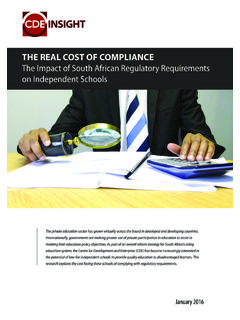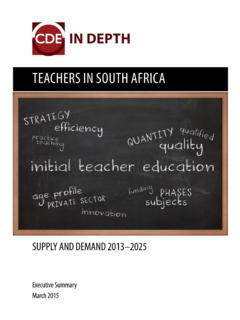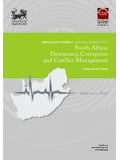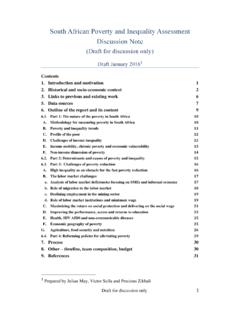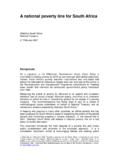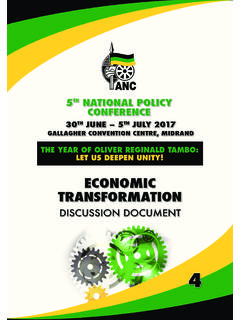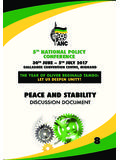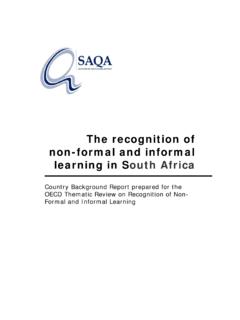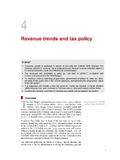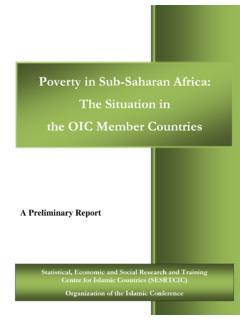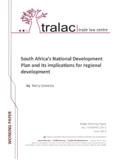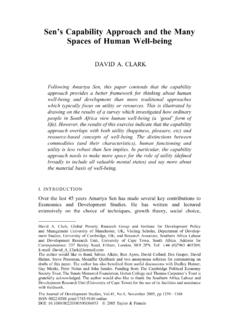Transcription of Building on what works in education - CDE
1 The Centre for Development and Enterprise Building on what works in education Concise summaries of ongoing policy research aimed at helping to improve the national education system what DOES RESEARCH TELL US ABOUT. TEACHERS, TEACHING AND LEARNER. PERFORMANCE IN MATHEMATICS? This report summarises original research carried out by CDE on factors which have an impact on the teaching and learning of mathematics and science in a sample of urban and rural public high schools. The findings are presented against a background of other significant research reports on the same broad topic.
2 Some of the CDE findings may come as a surprise to readers who are not educational experts. Among them were the lack of significant relationships between teacher qualifications and experience and learner results in mathematics and science. The same was true of the ratio of learners to educators. Such challenges to common sense' notions of what drives learner performance led CDE to look at its own and other research for alternative explanations of variations in school, teacher and learner performance, in mathematics in particular. This body of research has illuminated the key factors involved in effective mathematics teaching and learning, with important policy implications.
3 The report concludes with recommendations about the changes needed in public and private sector policy and practice, if pervasive and deep-seated challenges to better mathematics achievement in schools are to be successfully addressed. INTRODUCTION. Since 2004 the Centre for Development and Enterprise (CDE) has been conducting ongoing research into mathematics and science achievement in South Africa. These are key gateway subjects that open up most higher education opportunities and they are critical competencies for the development of sorely-needed high-level skills.
4 These in turn are vital for job creation, economic growth and the full development of national capacities. Number 7 October 2014. what DOES RESEARCH TELL US ABOUT TEACHERS, TEACHING AND LEARNER PERFORMANCE IN MATHEMATICS? CDE's research (CDE, 2010) has shown that a small minority of South African secondary schools produce most of the country's National Senior Certificate (NSC) passes in mathematics and science. In 2008 some per cent of the approximately 6 270 secondary schools produced 50 per cent of the mathematics passes, and per cent of the schools produced 50 per cent of the science passes.
5 When CDE examined the 2010 NSC results, it was clear that below this small number of first-tier'. schools was a group of about 1 000 second-tier' schools that performed above the national average for mathematics, but below the top performing schools. However, the performance of most of the second- tier schools was erratic, moving upward or downward in their mathematics and science results over the three years studied. Despite this unpredictability, these schools could offer scope for expanding the pool of learners who pass NSC mathematics and science. To investigate the causes of the unpredictability and explore factors that could make their performance more consistent and better, CDE conducted research on the quality of mathematics and science teaching and learning at 124 second-tier public secondary schools in Gauteng and KwaZulu- Natal.
6 Objective and subjective factors were investigated for their potential influence on the schools'. mathematics and science results. In addition to this CDE research, several other significant research reports that examine a variety of factors impacting on learner performance in mathematics have been published (Carnoy, Chisholm, Findings have & Chilisa, 2012; DBE, 2010; HSRC, 2013; Moloi & Chetty, 2011; NEEDU, 2013; Spaull & Venkatakrishnan, significant 2014; N. Taylor, Van der Berg & Mabogoane, 2013) as well as some other smaller studies (for example, implications for Adler & Venkatakrishnan, 2014; Bohlmann & Pretorius, 2008).
7 As the findings from these studies provided the opportunity to assess, corroborate or amplify CDE's findings, it was decided to include policy-makers, them in this report. However, while the CDE research on these second-tier schools investigated both donors, opinion- mathematics and science achievement, most of the studies above researched numeracy or mathematics makers and performance only, so the main focus of this report is on mathematics teaching and learning. researchers The report provides an overview of the key findings of the CDE study on second-tier schools and how these relate to research findings from other South African research on learner performance in mathematics.
8 To throw more light on some findings other developing country studies were also consulted. Taken together, the findings have significant implications for policy-makers, donors, opinion-makers and researchers in determining fruitful areas for policy change, interventions and further research to improve the quality of mathematics teaching and learning in South African schools. The report thus concludes with a set of recommendations. THE CONTEXT. Of all the factors in South Africa that impact on mathematics and science achievement, socio- economic ones, especially poverty, may be the most important (Crouch & Mabogoane, 2001; Spaull, 2013).
9 Contextual constraints affecting learner performance in mathematics are complex, intertwined and often structural. In South Africa these include a lack of facilities and resources at many schools, large class sizes, inadequate teacher education , poor learner commitment and discipline, inadequate parental involvement, to name but a few. Most of these derive from the country's apartheid history and Number 7 October 2014 2. what DOES RESEARCH TELL US ABOUT TEACHERS, TEACHING AND LEARNER PERFORMANCE IN MATHEMATICS? the very high levels of inequality in society. This report does not attempt to discuss these constraints in any detail, but they form an all-important backdrop for any interventions to improve mathematics teaching and learning in South Africa.
10 It is common cause that the quality of the South African schooling system as a whole is poor and that levels of literacy and numeracy are dismally low. Learner achievement in mathematics and science, while slowly improving, is still at an unacceptably low level. Mathematics achievement in the NSC has improved from a per cent pass rate in 2008 to per cent in 2013. However, the percentage of candidates who achieve a university entrance pass1. remains low ( per cent in 2013, up from only per cent in 2008). The level of pass achieved by learners in mathematics has also increased between 2010 and 2013.

